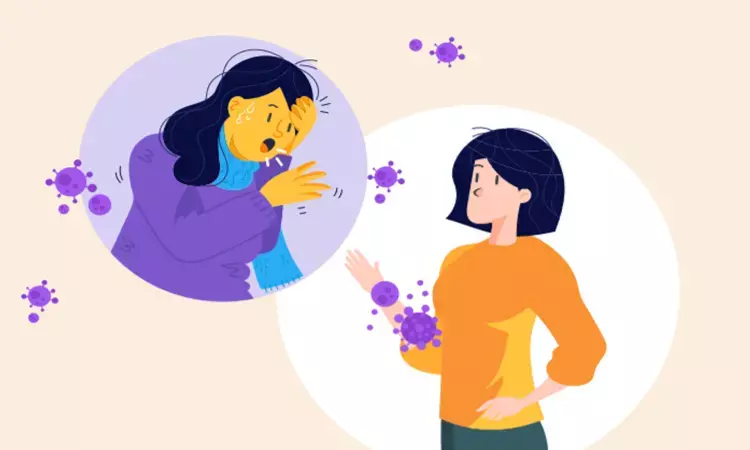- Home
- Medical news & Guidelines
- Anesthesiology
- Cardiology and CTVS
- Critical Care
- Dentistry
- Dermatology
- Diabetes and Endocrinology
- ENT
- Gastroenterology
- Medicine
- Nephrology
- Neurology
- Obstretics-Gynaecology
- Oncology
- Ophthalmology
- Orthopaedics
- Pediatrics-Neonatology
- Psychiatry
- Pulmonology
- Radiology
- Surgery
- Urology
- Laboratory Medicine
- Diet
- Nursing
- Paramedical
- Physiotherapy
- Health news
- Fact Check
- Bone Health Fact Check
- Brain Health Fact Check
- Cancer Related Fact Check
- Child Care Fact Check
- Dental and oral health fact check
- Diabetes and metabolic health fact check
- Diet and Nutrition Fact Check
- Eye and ENT Care Fact Check
- Fitness fact check
- Gut health fact check
- Heart health fact check
- Kidney health fact check
- Medical education fact check
- Men's health fact check
- Respiratory fact check
- Skin and hair care fact check
- Vaccine and Immunization fact check
- Women's health fact check
- AYUSH
- State News
- Andaman and Nicobar Islands
- Andhra Pradesh
- Arunachal Pradesh
- Assam
- Bihar
- Chandigarh
- Chattisgarh
- Dadra and Nagar Haveli
- Daman and Diu
- Delhi
- Goa
- Gujarat
- Haryana
- Himachal Pradesh
- Jammu & Kashmir
- Jharkhand
- Karnataka
- Kerala
- Ladakh
- Lakshadweep
- Madhya Pradesh
- Maharashtra
- Manipur
- Meghalaya
- Mizoram
- Nagaland
- Odisha
- Puducherry
- Punjab
- Rajasthan
- Sikkim
- Tamil Nadu
- Telangana
- Tripura
- Uttar Pradesh
- Uttrakhand
- West Bengal
- Medical Education
- Industry
You May Catch Coronavirus More Than Once, warns WHO

World Health Organization has stated that catching Covid-19 once may not protect one from getting it again. The new finding may jeopardize efforts to allow people to return to work after recovering from the virus.
"There is currently no evidence that people who have recovered from Covid-19 and have antibodies are protected from a second infection," the United Nations agency said in an April 24 statement.
The WHO guidance came after some governments suggested that people who have antibodies to the coronavirus could be issued an "immunity passport" or "risk-free certificate" that would allow them to travel or return to work, based on the assumption that they were safe from re-infection, according to the statement. People issued such a certificate could ignore public-health guidance, increasing the risk of the disease spreading further.
Chile was the first country to announce plans to issue immunity cards based partly on antibody tests. This has raised concerns because the tests have proven unreliable elsewhere, and some people may get deliberately ill in order to obtain the card. The U.S. and others have nonetheless said they're looking into the option.
While there's a consensus that the key to ending the coronavirus pandemic is establishing co-called herd immunity, there are many unknowns. One is whether researchers can develop a safe and effective vaccine. Another is how long people who've recovered have immunity; reinfection after months or years is common with other human coronaviruses. Finally, it's not clear what percentage of people must be immune to protect the "herd." That depends on the contagiousness of the virus.
The WHO said it's reviewing the scientific evidence on antibody responses to coronavirus, but as yet no study has evaluated whether the presence of antibodies "confers immunity to subsequent infection by this virus in humans." And while many countries are currently testing for antibodies, these studies aren't designed to determine whether people recovered from the disease acquire immunity, the agency said.
As the hunt for a vaccine continues around the world, the WHO has formed an international alliance to ensure that treatments are distributed fairly. French President Emmanuel Macron, European Commission President Ursula von der Leyen and the Bill and Melinda Gates Foundation are involved in the alliance.
Hina Zahid Joined Medical Dialogue in 2017 with a passion to work as a Reporter. She coordinates with various national and international journals and association and covers all the stories related to Medical guidelines, Medical Journals, rare medical surgeries as well as all the updates in the medical field. Email: editorial@medicaldialogues.in. Contact no. 011-43720751
Dr Kamal Kant Kohli-MBBS, DTCD- a chest specialist with more than 30 years of practice and a flair for writing clinical articles, Dr Kamal Kant Kohli joined Medical Dialogues as a Chief Editor of Medical News. Besides writing articles, as an editor, he proofreads and verifies all the medical content published on Medical Dialogues including those coming from journals, studies,medical conferences,guidelines etc. Email: drkohli@medicaldialogues.in. Contact no. 011-43720751


